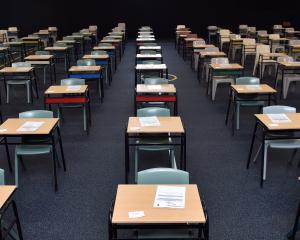National certificate of educational achievement (NCEA) exams begin in less than two months, and Otago secondary school teachers are concerned about the effect of planned strike action on their pupils' preparations for the exams.
New Zealand Post Primary Teachers' Association executive Otago representative Jocelyn Hunter said eight separate strikes affecting year 9, 10 and 11 pupils were planned to start on October 14.
The strikes meant year 9 pupils would not be taught on October 20, November 2, November 18 and December 2.
Year 10 pupils would miss school on October 27, November 11 and November 23, while year 11 pupils would miss October 14.
From next term, secondary school teachers would also make themselves unavailable for meetings, including parent interviews, before 8.30am and after 5pm, and refuse to go to work at weekends and during the holidays after term four ended, she said.
"Teachers are very reluctant to take action which will affect their senior pupils as they prepare for their NCEA exams.
"For that reason, we have scheduled year 11 pupils to be off on the first Thursday of term 4.
"It's not ideal, but we have got to the situation where we have to take a stand," she said.
The proposed round of strikes follows a one-day nationwide strike last week after pay talks between the PPTA and the Ministry of Education failed.
Teachers are seeking a 4% pay rise, rejecting the ministry's offer of a 1.5% pay rise and a further 1% next year.
PPTA president Kate Gainsford yesterday accused the Government of not viewing education as a priority.
"It's very obvious that education ... is not the priority that business is for this Government.
"There's a lot of rhetoric but when it comes to action and real commitments, they're pretty thin on the ground.
"Issues such as class size, duty on and off school grounds, and health and safety are being ignored, despite many of the claims surrounding these issues are low or no cost," she said.
Education Minister Anne Tolley said the strike action would only create uncertainty and confusion for pupils and parents, and she urged teachers to resume negotiations.
"This will cause distress for students and parents, who are being used by the union to make a political point," she said.
"The PPTA has been very quick to walk away from bargaining, with only 13 days of negotiation so far."
Teachers needed to recognise the whole country was working in difficult economic circumstances, she said.
Ms Gainsford said a better offer would be needed if teachers were to return to the bargaining table.





